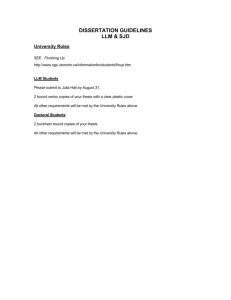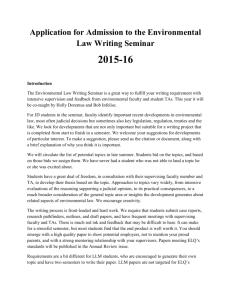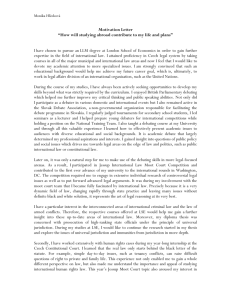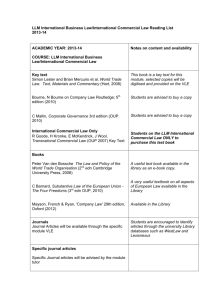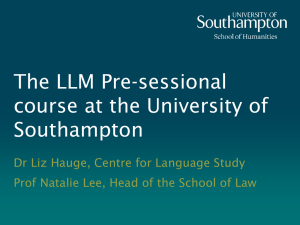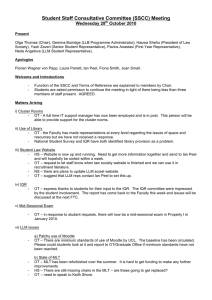LLM Master of Laws
advertisement
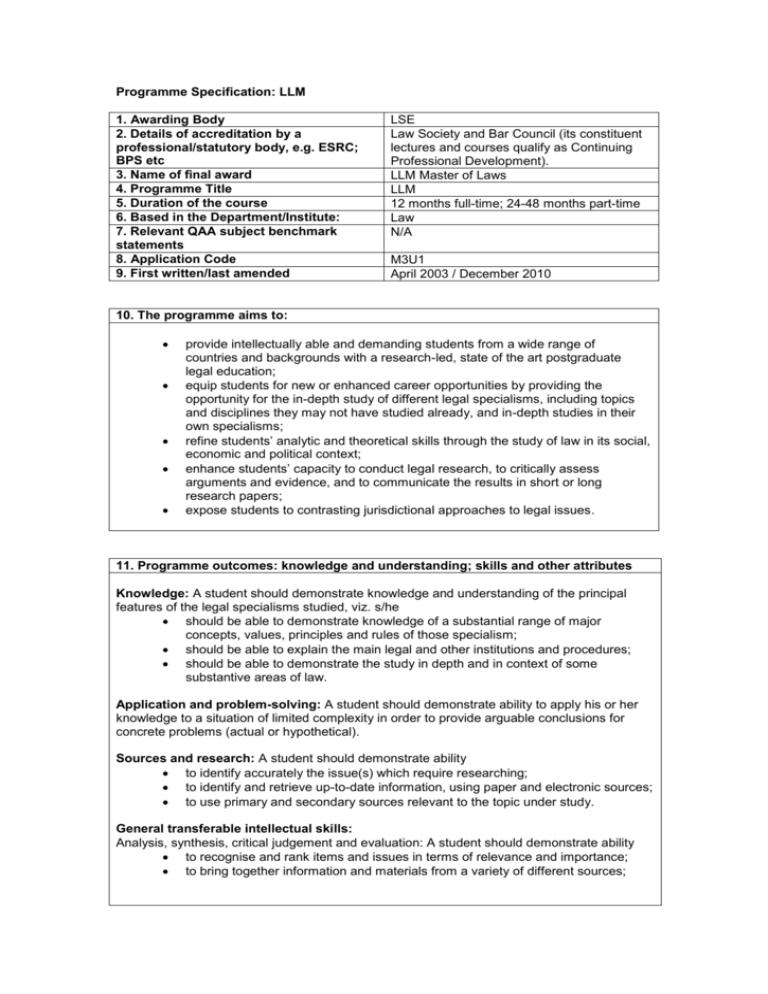
Programme Specification: LLM 1. Awarding Body 2. Details of accreditation by a professional/statutory body, e.g. ESRC; BPS etc 3. Name of final award 4. Programme Title 5. Duration of the course 6. Based in the Department/Institute: 7. Relevant QAA subject benchmark statements 8. Application Code 9. First written/last amended LSE Law Society and Bar Council (its constituent lectures and courses qualify as Continuing Professional Development). LLM Master of Laws LLM 12 months full-time; 24-48 months part-time Law N/A M3U1 April 2003 / December 2010 10. The programme aims to: provide intellectually able and demanding students from a wide range of countries and backgrounds with a research-led, state of the art postgraduate legal education; equip students for new or enhanced career opportunities by providing the opportunity for the in-depth study of different legal specialisms, including topics and disciplines they may not have studied already, and in-depth studies in their own specialisms; refine students’ analytic and theoretical skills through the study of law in its social, economic and political context; enhance students’ capacity to conduct legal research, to critically assess arguments and evidence, and to communicate the results in short or long research papers; expose students to contrasting jurisdictional approaches to legal issues. 11. Programme outcomes: knowledge and understanding; skills and other attributes Knowledge: A student should demonstrate knowledge and understanding of the principal features of the legal specialisms studied, viz. s/he should be able to demonstrate knowledge of a substantial range of major concepts, values, principles and rules of those specialism; should be able to explain the main legal and other institutions and procedures; should be able to demonstrate the study in depth and in context of some substantive areas of law. Application and problem-solving: A student should demonstrate ability to apply his or her knowledge to a situation of limited complexity in order to provide arguable conclusions for concrete problems (actual or hypothetical). Sources and research: A student should demonstrate ability to identify accurately the issue(s) which require researching; to identify and retrieve up-to-date information, using paper and electronic sources; to use primary and secondary sources relevant to the topic under study. General transferable intellectual skills: Analysis, synthesis, critical judgement and evaluation: A student should demonstrate ability to recognise and rank items and issues in terms of relevance and importance; to bring together information and materials from a variety of different sources; to produce a synthesis of relevant doctrinal and policy issues in relation to a topic; to make a critical judgement of the merits of particular arguments; to present and make a reasoned choice between alternative solutions. Autonomy and ability to learn: A student should demonstrate ability, with limited guidance; to act independently in planning and undertaking tasks in the areas of law which he or she has already studied; to be able to undertake independent research in areas which he or she has not previously studied starting from standard information sources; to reflect on his or her own learning, and to seek and make use of feedback. Key Skills: Communication and Literacy: Both orally and in writing, a student should demonstrate ability to understand and use the English language proficiently in relation to legal matters; to present knowledge or an argument in a way which is comprehensible to others and which is directed at their concerns; to read and discuss legal materials which are written in technical and complex language. Other key skills: numeracy, information technology and teamwork: A student should demonstrate ability to produce a word-processed essay or other text and to present such work in an appropriate form; to use the internet and e-mail; to use some electronic information retrieval systems; to work in groups as a participant who contributes effectively to the group’s task; where relevant and as the basis for an argument, to use, present and evaluate information provided in numerical or statistical form; Information relating to careers. 12. Teaching, learning and assessment strategies to enable outcomes to be achieved and demonstrated The LLM programme is examined by the equivalent of four full unit courses (some courses are half-units). A compulsory writing requirement applies: a minimum of .5 units must be assessed by an 8,000 word extended (where the essay is the nominated course assessment) or elective (where the student elects to write an essay) essay. The other units taken by students may also be examined by elective/extended essay (half unit), or dissertation (full unit), to a maximum of 1.5 units, although most units are examined by a traditional three hour examination (full unit) or a two hour examination (half unit). Dissertation/elective essay: unless an exception is granted, students audit a taught course that best reflects their selected dissertation/elective essay topic. This ensures adequate grounding in the fundamental principles and rules in the relevant area. In addition, students are given individual direction from the course convenor in selecting a research topic and planning the thesis. Further general assistance is provided by a programme of Dissertation Seminars, designed to assist students in preparing and producing their written assessment. Taught courses: teaching is primarily through seminars (capped at 30 students). Courses with enrolments of over 30 students are either taught through (i) parallel seminars or (ii) lectures and supporting back-up classes. All students are invited to undertake formative assessments during the year for all taught courses. An annual programme of LLM Specialist Seminars, across a range of subjects, provides additional non-course-specific interaction for students on the programme. Students are allocated an Academic Adviser who is responsible for monitoring their progress through regular meetings, and providing appropriate guidance. Additional support is available through the LLM Student Advisers (doctoral students in the department). 13. Programme structures and requirements, levels, modules and awards See LLM programme regulations. Additional information 14. Criteria for admission to the programme Admission is highly competitive. At a minimum, students should have a good degree in law (for example, an upper second class English LLB, or good results in the French Maîtrise en Droit, or a high grade point average in the American JD), or a good degree in another discipline together with am appropriate professional qualification in law (such as the CPE). Precise entry requirements are tailored to the system of legal education in the countries from which students apply. Students without a law background need to demonstrate a high level of professional or academic experience in areas closely related to the subjects they wish to study. Typically more than half of LSE’s LLM students are from overseas. In addition, the English language requirements are a minimum score of 7.5 in the British Council’s English Language Test; or 650 in the TOEFL (280 in the TOEFL computer based test); or grade A in the Cambridge First Certificate, of Grades A-B in the Cambridge Proficiency Certificate. 15. Indicators of quality Entrance requirements (please see details in no. 14); External examiners’ reports; Research quality: In the 2008 Research Assessment Exercise, 75 per cent of the Law Department’s research was rated either world-class or of international renown. The Department was rated the best law department in the UK, both on grade point average and on proportion of 4* research; Authorship of key texts: members of the Department have written key texts in many of the LLM subject areas; Members of the Department serve or have served on the editorial boards of many leading journals; The LSE Careers Centre website provides data on career destinations of LSE graduates. 16. Methods for evaluating and improving the quality and standard of teaching and learning Student assessment surveys for individual courses and for programme; External examiners’ reports; Complaints/ Consultation system—including Staff/Student Liaison Committee; Law Department Teaching Committee periodic review; Review/promotion process for staff includes an assessment of teaching; The Teaching and Learning Centre is available to monitor and observe teaching and offers constructive advice on how to improve the standard of teaching and quality; The Teaching Learning and Assessment Committee which regulates all aspects of teaching quality; Departmental TLAC review once every five years; The Graduate Studies Sub-Committee which oversees all graduate programmes and ensures that significant changes to programmes and courses pass through a sequence of formal stages, so that curricular changes are appropriate and compatible with other developments.
